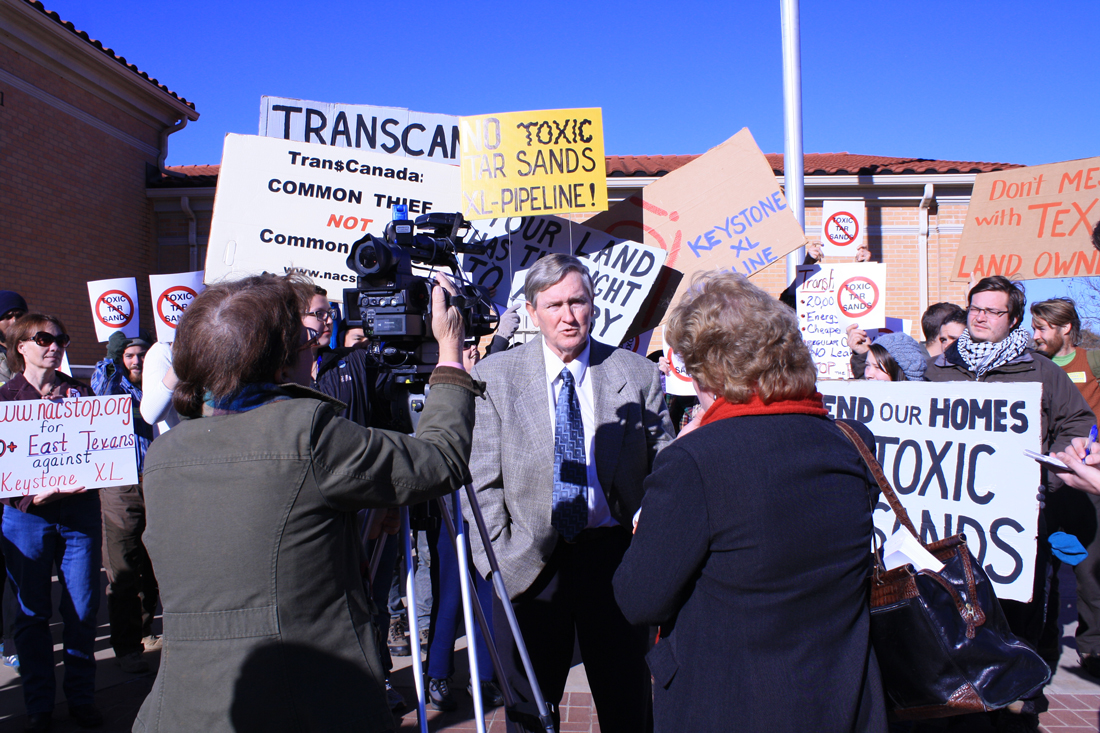The last of the Tar Sands Blockade tree-sitters voluntarily climbed down from their perches in Winnsboro just before Christmas, after maintaining their post in the path of the East Texas portion of the Keystone XL pipeline for 85 days.
But blockaders say their efforts in Texas to halt the southern leg of TransCanada’s pipeline — which will carry poisonous and corrosive tar sands bitumen from Canada all the way to the free-trade zone in Port Arthur — is far from over.
The tree stand blockade proved that TransCanada’s pipeline can be rerouted at will, opposition leaders said, despite what the company has claimed in eminent domain land condemnations — information that can be used by future landowners who want to keep the pipeline off their property. The blockaders are also planning a new mass action for Jan. 7 near Livingston, to keep the protest in the public eye.
Meanwhile, landowner Mike Bishop, from the Nacogdoches County town of Douglass, will go to court on Dec. 28 in a fraud lawsuit that could have major implications for the company. The hearing will be held in front of the same judge who has been in on the Bishop-TransCanada land battle for three years — but who decided just a week ago that he might not have jurisdiction in the case after all.
Although Bishop signed a contract allowing TransCanada to lay a section of the Keystone XL across his land, he is suing for fraud on the grounds that TransCanada claimed in permit applications that it would be running conventional crude oil through the pipeline. “By definition, tar sands are not conventional crude,” Bishop said, adding that he signed the contract only because the company threatened to use eminent domain powers to take his land anyway.
Tar sands are a mix of sand or clay and water saturated with very heavy oil that has to be heated and infused with benzene and other chemicals to be liquefied enough to be moved through a pipeline. It is extremely corrosive, and when it leaks, the mixture settles into the ground rather than rising to the surface like conventional hydrocarbons, making cleanup after spills extremely difficult.
A retired chemist who served in the Marine Corps, Bishop said he has no problem with pipelines in general and that a six-acre swath of land down the western edge of his 20-acre property already contains three pipelines. “When I first got a form letter from TransCanada four years ago, I thought they would be putting their pipeline along that existing easement,” he said.
More than a year later surveyors showed up on his property without notice, and he tossed them off. Several months later they returned with a court order. “They had an attorney with them this time, and the Sheriff’s Department called to tell me I needed to talk with them,” the landowner said.
The attorney presented Bishop with a temporary restraining order signed by Nacogdoches County Court Judge Jack Sinz forcing him to allow the surveyors onto his property. Bishop said the surveyors verbally agreed to use the existing pipeline easement, “and we shook on it.”
But TransCanada changed the route and told Bishop in an e-mail that their engineers had decided to run the line through his front yard — which included a large vegetable patch and a small orchard — about 120 feet from his front door.
He fought back, hiring a lawyer to represent him in a condemnation hearing that he lost. “The judge didn’t want to hear any constitutional arguments against taking my land,” said Bishop. “He just wanted to settle on a fair price, which was determined to be $8,000.”
Bishop refused the offer, and several months later Sinz issued a writ of possession, allowing TransCanada to begin working on his land. At a subsequent mediation hearing in Austin, Bishop was offered and accepted about $75,000. However, after paying his legal fees and paying off the financial institution that held the mortgage on the now devalued land and other related expenses, he wound up with just $3,800.
That was before the former Marine discovered that the pipes would be carrying tar sands bitumen instead of traditional Canadian crude oil. He sued TransCanada for fraud, and in early December, with bulldozers on the way to cut his trees, Bishop asked Sinz for a temporary restraining order to stop them, which Sinz granted. Two days later that order was rescinded at the request of TransCanada, and the trees were felled and the garden torn up.
At a second hearing on Dec. 19, Sinz ordered both Bishop and TransCanada to file briefs on why his court should have jurisdiction over the lawsuit rather than it being heard by a district court. Those briefs are due on Friday.
“This case has been in his court for three years,” Bishop said of the judge. “It was fine for him to condemn my property, fine for him to offer a TRO to force me to allow the surveyors on my property, fine for him to sign a writ of possession to TransCanada to take my property, but now he doesn’t know if he has jurisdiction.”
Without another TRO, Bishop said that he expects TransCanada to begin trenching his land in less than three weeks. The company has already brought gravel to the edge of the property where the equipment will enter.
All Bishop really wants, he said, is to get his case in front of a jury. “If you let me get in front of a jury, I think this pipeline would be stopped in its tracks. And that’s something TransCanada cannot afford to have happen. Imagine if I prevail in my fraud suit and TransCanada is forced to return my property to its initial condition. They would suddenly be subject to having every landowner with whom they entered contracts by coercion and threats of eminent domain sue them for fraud.”
Ramsey Sprague, a spokesman for the Tar Sands Blockade and former campaign director of the Green Party of Texas, said TransCanada has shown over and over that it has little regard for the people whose homes are in the pipeline path. “They have just bullied people,” he said.
On the other hand, he said, TransCanada can be very cooperative when it wants. On a Wood County property where Nestlé-owned Ozarka gets some of its spring water, TransCanada agreed to install extra-thick pipe, uses as little of the land as possible, and added special cleanup agreements to their contracts.
Sprague said he doesn’t know whether Nestlé got better treatment because the major corporation could afford to go toe-to-toe with TransCanada in court. But he said it’s clear that the pipeline company can alter its planned route when it wants to. “They moved the pipeline around the Winnsboro tree sitters, so we showed they could do that if they wanted,” he said.
Ron Seifert, another Tar Sands Blockade spokesman, agreed. If TransCanada could reroute the pipeline around the tree stand, it could have zigzagged around private property as well, he said. “They didn’t have to go through people’s property the way they did. They simply found it more effective to put profits over people.”
Sprague said Keystone opponents are “hoping that Mike Bishop standing up for his rights as a landowner will become a lightning rod for other landowners up and down the pipeline who will also stand up and say that, for all these reasons, the pipeline has to be stopped.”
Bishop won’t be fighting alone, Sprague said. The blockade group is helping raise money for his legal fight and has spent the last couple of months gearing up for the Jan. 7 action in East Texas, details of which they declined to discuss.
Fort Worth Weekly was unable to reach a TransCanada spokesperson for comment for this story.












